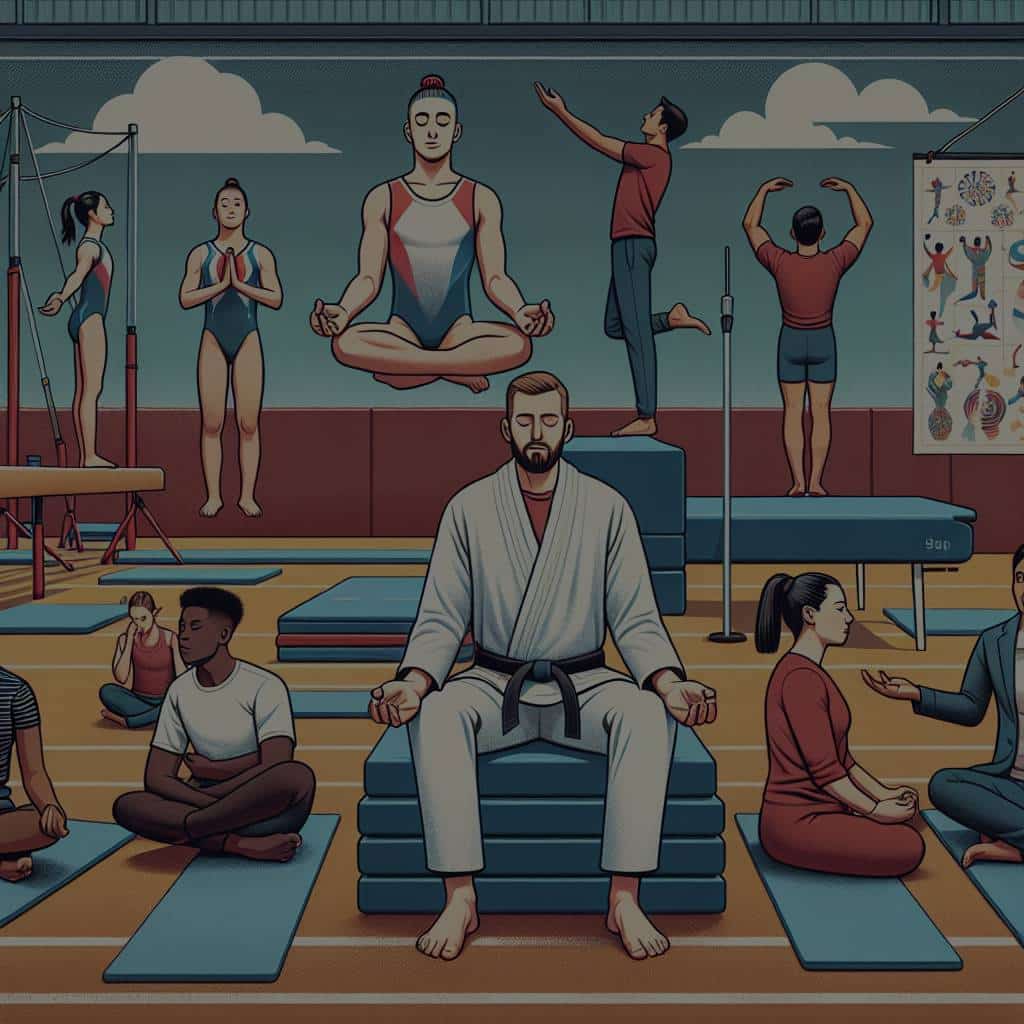What Are the Techniques for Reducing Anxiety Before Major Gymnastics Competitions?

Anxiety before a major gymnastics meet is a common occurrence. The anticipation of performing intricate skills on different apparatuses under the watchful eyes of spectators can be daunting. As a gymnast, what can you do to combat this? This article explores various techniques that will help you manage your nerves and enhance your performance.
Identifying and Understanding Anxiety
Before we begin, it’s important to clarify anxiety. It is a natural reaction to a perceived threat. In the context of gymnastics, this threat could be the fear of failing a routine, the dread of competition, or the pressure to impress judges and spectators. These feelings of anxiety can manifest as physical symptoms such as a racing heartbeat, shaky hands, or a dry mouth. However, it can also affect your mental state, causing you to lose focus or doubt your ability.
Sujet a lire : How Can Advanced Fabrics Improve Aerodynamics for Speed Skaters?
Anxiety isn’t necessarily a bad thing. It can help you stay alert and focused. The issue arises when it becomes overwhelming and negatively impacts your performance. That’s why it’s crucial to identify your triggers and understand how your body and mind react to stress. This self-awareness will prepare you to implement effective strategies to manage your nerves.
Breathing and Relaxation Techniques
When you’re feeling anxious, your body is likely in a state of heightened arousal. This is the body’s natural response to stress, but it can interfere with your ability to perform your best. To counteract this, you can engage in breathing and relaxation techniques.
Dans le meme genre : What Strategies Can Optimize Performance for Athletes with Visual Impairments?
Deep breathing exercises can help you calm down by slowing your heart rate and lowering your blood pressure. Try inhaling deeply through your nose, hold your breath for a few seconds, and then exhale slowly through your mouth. Repeat this several times until you start to feel more relaxed.
Progressive muscle relaxation is another useful technique. This involves tensing and then relaxing different muscle groups in your body. By doing this, you’ll become more aware of physical sensations and learn how to control your body’s response to stress.
Visualization and Mental Rehearsal
Mental preparation is just as important as physical training in gymnastics. Among the most effective mental techniques is visualization. This involves imagining yourself performing your routine perfectly. Close your eyes and visualize every movement, every flip, and every landing. Hear the crowd cheering, feel the mat beneath your hands, and see yourself nailing your routine.
Mental rehearsal, on the other hand, is the process of repeatedly going over your routine in your mind. It’s like watching a movie of your performance over and over again. This technique can help reinforce your physical training and increase your confidence.
Maintain a Balanced Diet and Sleep Schedule
Believe it or not, your lifestyle habits can directly impact your anxiety levels. Maintaining a balanced diet and sleep schedule is crucial for keeping your body and mind in top shape for competition.
Ensure you’re getting enough protein for muscle repair, carbohydrates for energy, and vitamins and minerals for overall health. Avoid excessive caffeine and sugar, which can exacerbate anxiety symptoms.
Sleep is equally important. Lack of sleep can lead to fatigue, decreased performance, and increased anxiety. Aim for 7-9 hours of sleep every night, especially leading up to a big competition.
Seek Professional Help
If your anxiety is too overwhelming and you’re struggling to manage it on your own, don’t hesitate to seek professional help. Psychologists, particularly those specializing in sports psychology, can provide you with tailored strategies and techniques to cope with your nerves.
Remember, it’s completely normal to feel nervous before a gymnastics meet. However, it’s crucial to learn how to manage your anxiety effectively so that it doesn’t hinder your performance. By implementing these techniques, you’ll be better equipped to handle the pressure and perform to the best of your ability. Now, go out there and show them what you’ve got!
Building Mental Toughness and Confidence
Building mental toughness and confidence is a key aspect in reducing pre-competition nerves. Mental toughness equips you to handle stress, overcome adversity, and perform under pressure. It involves developing a positive mindset, setting goals, and maintaining focus despite the challenges you may face.
Start by setting realistic yet challenging goals for yourself. These goals should motivate you to push beyond your comfort zone, but they should also be achievable to avoid discouragement. Once you’ve set these goals, maintain your focus on them. Do not allow mistakes or setbacks to deter you. Instead, view them as opportunities to learn and grow.
Building confidence, on the other hand, requires regular practice and positive self-talk. Confidence is not something that magically appears; it is developed over time through repeated success and overcoming obstacles. Therefore, make sure you’re practicing your skills and routines regularly. Additionally, focus on your strengths and achievements, not just your weaknesses and failures. Positive self-talk can significantly enhance your self-esteem and resilience.
Adopting a Pre-Meet Routine
Adopting a consistent pre-meet routine can significantly help in reducing competition anxiety. This routine could include a combination of physical warm-ups, mental preparation techniques, and even personal rituals that help calm your nerves and boost your confidence.
Start with a physical warm-up to prepare your body for the meet. This could involve stretching, light cardio exercises, or practicing a few elements of your routine. A good physical warm-up not only prepares your muscles but can also help alleviate the physical symptoms of anxiety.
Next, engage in mental preparation. This could involve the visualization and mental rehearsal techniques discussed earlier. Additionally, you could also engage in positive self-talk, reminding yourself of your abilities and past successes.
Lastly, consider adopting personal rituals. These could be anything from listening to your favorite music, meditating, or even eating a specific meal before the meet. Personal rituals can provide a sense of comfort and stability, making you feel more prepared and confident before the competition.
Conclusion
In conclusion, managing anxiety before a major gymnastics meet isn’t a one-size-fits-all solution. Different techniques work for different individuals, and what helps one gymnast may not necessarily work for another. However, the key is to identify what techniques best help you manage your nerves and consistently implement them. Remember, it’s okay to feel anxious. Even the most experienced gymnasts get nervous before a big meet.
The important thing is to not let these nerves overwhelm you and hinder your performance. Whether it’s through deep breathing exercises, visualization, maintaining a balanced diet and sleep schedule, building mental toughness, or adopting a pre-meet routine, there are multiple techniques you can use to manage your anxiety. With practice and consistency, you will be better equipped to handle your competition nerves and perform to the best of your ability.
Remember, gymnastics is not just about physical strength and agility; it’s also about mental toughness and resilience. Embrace the challenge, trust your training, and go out there and give it your best shot. Good luck!
